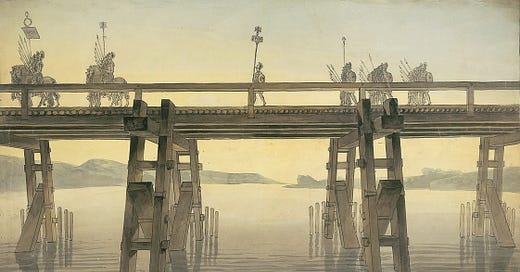If I asked you what the most famous river Caesar crossed is, you would no doubt speak the name Rubicon with eager boldness. Everybody knows about the Rubicon, and that time Caesar crossed it to shift Western History’s course forever. Everybody has read Caesar’s trod in plays, seen it in films, and some of us have replicated it in games like Total War in various forms. If, however, I were to be asked what is the most important river Caesar crossed, I would have to reply with the Rhine. There is a good chance you were unaware Caesar ever crossed it. Indeed, Caesar’s various water crossings to England and Germany often get overlooked in the popular mythos of the man. Caesar was quite the competent logician.
The reason I would declare the Rhine to be the most important river he crossed, as opposed to the most famous, is because of the bridges he built to do so. In fact, it appears Caesar’s bridges to Germany may have been the first ever to have been built - thus forever altering the German identity from “that which dweleth over the Rhine”, to “that which is reacheth by crossing the Rhine”. Up until the 50s BC, the Rhine was the sacred demarcation between father Germany and the valleys of Gaul that the Germans regularly raided, occasionally settle, and often traded along. Many times after causing problems, they would simply cross over to mythical Germany and her elder forests and no man would be brave enough to pursue forth.
Now, the reason Caesar built his bridges was very simple. Moving Germany from some mythical enchanted forest far away to a quick march across a man-made structure told the Germans that they were no longer able to do whatever they wanted without consequence. This is a move so powerful that German kings would actually reference it going forward as a way to break the ice if diplomacy with the Romans was going cold. When Caesar crossed the Rhine to confront King Ariovistus of the Suebi for his behavior, the king bemusingly said to Caeser:
I am not so uncivilized nor so ignorant of affairs, as not to know that the Aedui in the very last war with the Allobroges had neither rendered assistance to the Romans, nor received any from the Roman people in the struggles which the Aedui
It’s quite funny to see a German king say he may be German, but he’s not that German.
During his conquest of Gaul, Caesar wanted to prevent a German invasion that would no-doubt attempt to fill the vacuum. He ordered the construction of the bridges as a testimony to the Germans. Caesar’s bridges revealed that they were no longer protected. At will, Rome could erect a bridge wide enough for a legion to cross in a few minutes, rendering the sacred stream nothing more than a delay. In his punitive campaign against Ariovistus, the Germans ultimately decided to withdraw deeper into their woods and avoid the Rhine altogether. The Germans would have to make deals with the Romans there after, no longer free to raid as they pleased. The era of Roman-German direct diplomacy had begun.
Nonetheless, despite my preference for the Rhine, for the next 450 years Romans would set their gazes on the Rubicon for sensing who would be their next ruler and/or savior as times got harder. But time and time again, the emperor proved a pale shadow of those who began the river-trodding tradition. This appears to demonstrates a critical flaw in human reasoning: all patterns require three points of data, but the human brain assumes a patterns after just one. Historically, this has oddly rewarded humanity with survival more times than not, such that many members of our species retain this light form of autistic pattern generation. I would not call it pattern recognition, as it’s not a pattern. It’s imagination that something that happened once might repeat. That need to have a pattern hijacks our imagination to fill in the blanks. We want to see a pattern, even if it’s a singular point of exception to the norm.
The reality is, Caesar crossing the Rubicon was an exception. No one ever did what he did again, or at least not in any sort of gallantry as the citizenry witnessed. Those centuries of Rubicon gazing produced no heroes of the Empire. Though by the 5th century the people crossing the river were awfully German looking, and demanding an awfully large sum of gold. Had Romans lacked this logical flaw of humanity, they would have noticed the very consistent pattern they had set of underpaying their mercenaries from across the Alps.
It’s easy to draw comparisons here to the large tractions of the right wing often high on Hopium that someone may cross thwe Potomac, all the while making mild lip service to the barbarians flowing over the Grande. For the unbelieving world, this feels like the part where the bad guys win and everybody’s lives begin to fall apart under a dystopic cringe. But for the believer in Christ, we know all too well that God’s promise to topple the Tower of Babel extends through all time, and not just Nimrod’s divine compensation. Thus, in the valley of Despair wherinwhich Trump failed to cross his own Rubicon, it ought not be a surprise that a barbarian warlord like Musk decided to cross the Rhine instead.

Let us muse for a moment on Rubicons and Rhines, sacred streams which mark the passing of times. Have you ever considered numbers? Do you imagine hundreds of thousands of Germans crossing into Rome? You would be in error. Accounts say only 20,000-30,000 Germans crossed the frozen Rhine in 406 AD. Amongst those were the Goths, Alans, Suebi, Lombards, Vandals, and more or less every future royal line of Medieval Europe. it all started there, in that crowd of a few tens of thousands. Compared to Rome’s 30-60 million inhabitants and some 700,000 legionaries still around, you would be right to imagine this small band would be wiped out quickly. And yet, they were not. The Legions by this time were mostly Germans and they were not so eager to kill their own. Likewise, Rome was being depopulated by plagues and economic downturns and there wasn’t a great deal around to stop them. In fact, by this point the Franks had already settled into Gaul and with no orders from the insane Emperor Honorius, they marched on the German horde on their own - thereby forever becoming an independent power without any Imperial institutions left to tell them to stop. The whole affair was rather bizarre. But in the span of 4 years, those 30,000 Germans divided the West into a series of Foederatus states tangentially loyal to Rome.
And thus form 406 onward, the Germans went from “that which is reacheth by crossing the Rhine” to “That which ruleth West of the Rhine.”
This took just 4 years to achieve
The Rubicon was crossed once to change a republic into an empire. The Rhine was crossed once to make an Empire into warring states. So my dear Right Wing, please calm yourselves and recognize the real pattern being set. You stare at the Rubicon for even a ripple, while the Rhine is shaking from the hordes eagerly marching like a funeral vigil. Musk’s siege of the United States’ propaganda bureau ended with his acquiring it as his personal fiefdom - a warlord, mind you, who had already proven capable of bartering for dilapidated parts of the empire in regions of aerospace and automotion. It helps to imagine Musk more like a barbarian king demanding foederatus treaties with the Empire to run parts it has abandoned during its long decline, and his success will no doubt inspire more barbarians to begin eyeing parts of the empire to gobble up.
So fret not. Turbo America is here, but so may be the Foederati era as well. And it may only take 4 years to achieve.






But what if our Barbarian King is not allowed to run for president of Rome? Can he take control of the federal Roman Bureaucracy by serving under the president and then killing him after he is in control? What about the other figure heads? Perhaps our Barbarian King can figure out the details.